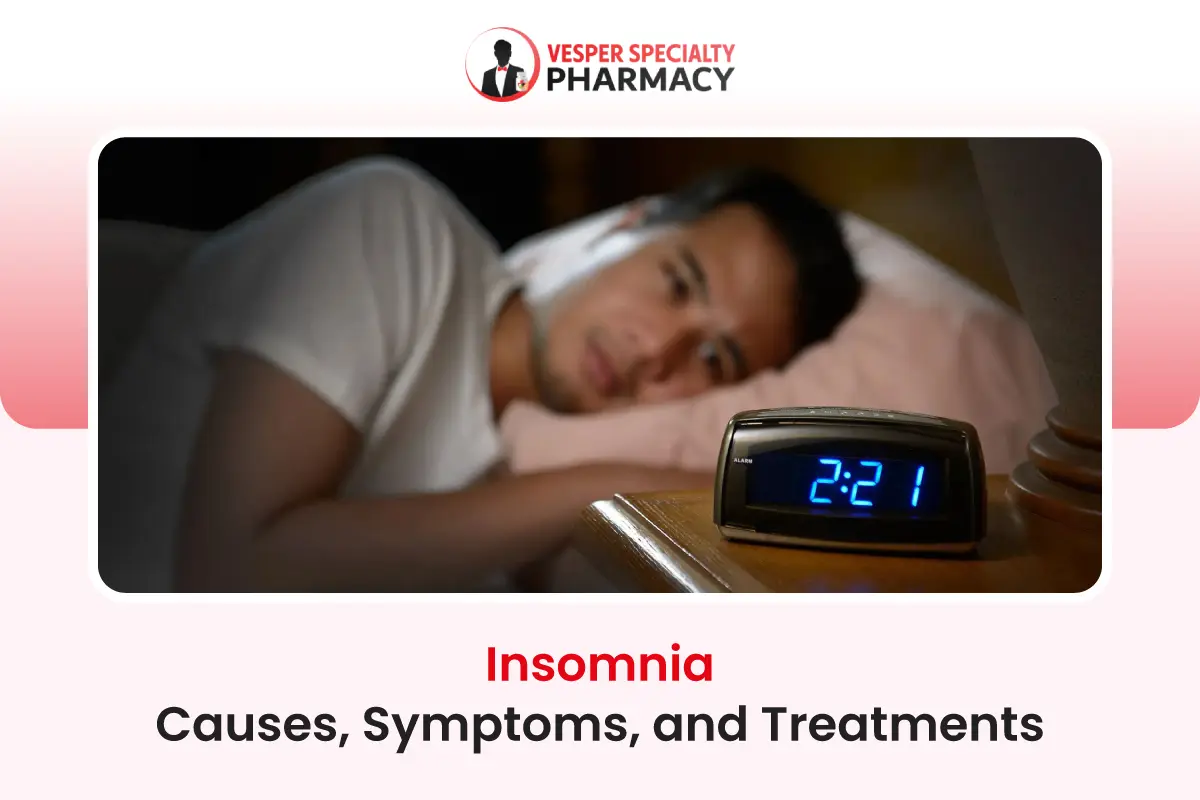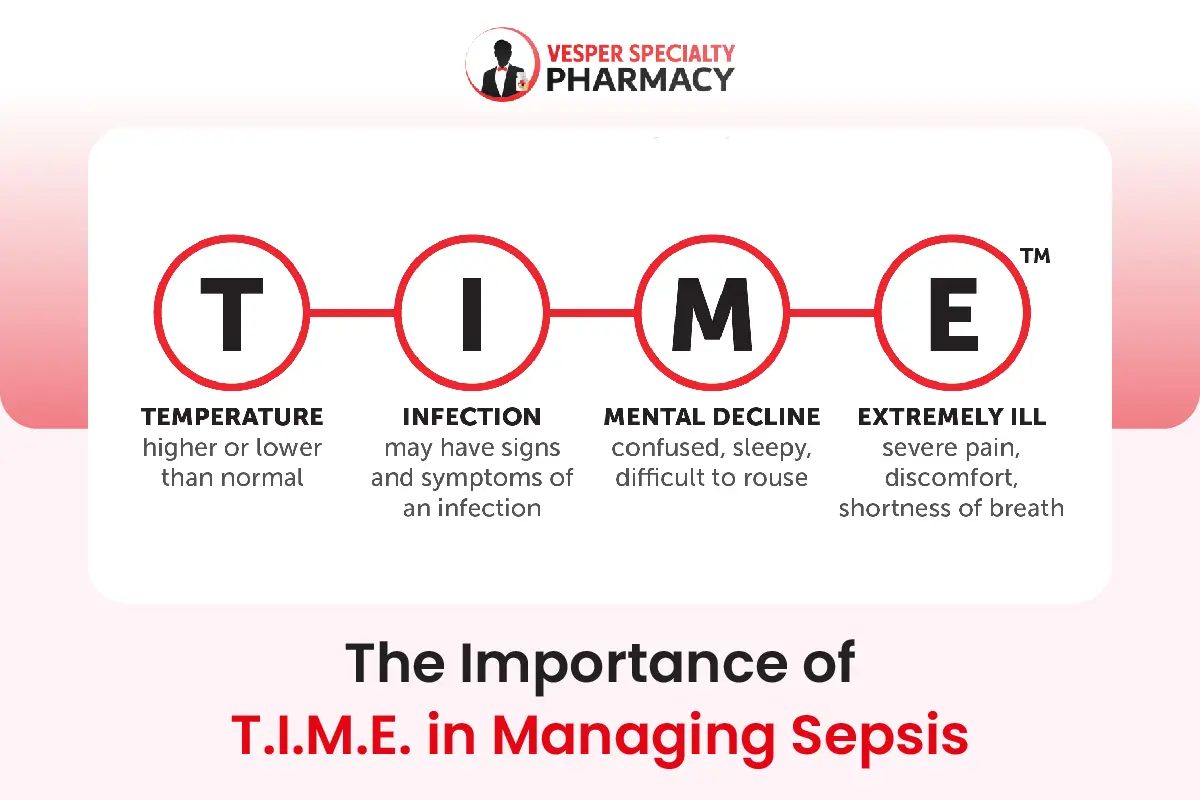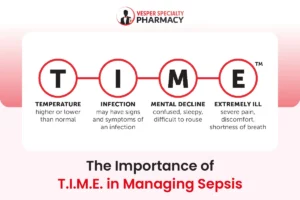What is insomnia ?
Insomnia, a type of sleep disorder, is the most common sleep condition. The symptoms of insomnia include difficulty falling asleep and/or frequent waking up during the night. If the symptoms happen more than 3 times per week for at least 3 months even with plenty of opportunities to sleep, you may be suffering from chronic insomnia.
Insomnia can have
Possible causes of insomnia
Substances / Medications
- Alcohol, Caffeine
- Decongestants: pseudoephedrine
- Medications used to treat depression: sertraline, fluoxetine, other SSRIs
- Corticosteroids: methylprednisolone, prednisone, dexamethasone, etc
- Stimulants such as amphetamines, phentermine
- Beta blockers: atenolol, metoprolol, carvedilol, labetalol, etc
Situational / Conditions
- Depression
- Anxiety
- Chronic stress
- Stressful life events or trauma such as job loss, divorce, or death in family
- Pain or discomfort at night
Non-drug treatments
Proper sleep hygiene can reduce or eliminate the need for drug treatment for insomnia.
- Keep the bedroom dark, comfortable, and quiet
- Keep a regular sleep schedule
- Avoid daytime naps, even after a poor night’s sleep, or limit to 30 mins
- Avoid thinking about anything stressful or arousing such as problems with relationships or work
- Reserve the bedroom for sleep and other appropriate activities (no TV or other stimulants)
- Regular moderate or small amounts of exercise are effective in promoting sleep
- Turn the face of the clock aside to minimize anxiety about falling asleep
- If unable to sleep, get up and do something to take your mind off sleeping
- Establish a pre-bedtime ritual to condition your body for sleep (e.g., relax with soft music, mild stretching, yoga, or pleasurable reading)
- Avoid exercising right before bedtime
- Do not eat heavy meals before bedtime
- Do not take caffeine in the afternoon
Treatment
If insomnia persists after implementing proper sleep hygiene and addressing possible causes, medication treatment is often used intermittently or on a nightly basis. There are many natural products, over the counter medications, and prescription medications available for the treatment of insomnia. Informing your doctor if you have trouble falling asleep, staying asleep, or both will help the doctor choose which medications are best for you. Medications should only be used for short term therapy (about 4 to 5 weeks).
Natural product
Melatonin is a hormone that your body makes and it regulates sleep-wake cycles. It is available as an over the counter supplement and frequently used for sleep. The recommended dosage for melatonin is 3 to 5 mg 3 to 4 hours before
Drug treatments
Over the counter drugs:
Antihistamines such as diphenhydramine and doxylamine have sedating effects. These are the most common over the counter medications to treat insomnia. They can be helpful for insomnia short term, but should not be used long term. Tolerance to sedative effects can develop within days. Side effects include dry mouth, blurry vision, constipation, confusion, and urinaryretention. These should be limited in elderly patients and avoided in patients with benign
Prescription drugs:
There are different classes of prescription drugs that are used often to help treat insomnia. You should consult with a healthcare provider to decide on which treatment option would best work for
“Z drugs” include Ambien, Lunesta, and Sonata. They are pure sedative medications with no effects on anxiety. Some side effects to watch out for are headache, dry mouth, unpleasant taste (mostly with Lunesta), and sleep behaviors [driving, eating, etc. (mostly with Ambien)].
Another class of medications often used for insomnia is benzodiazepines such as temazepam and lorazepam. They may be beneficial for patients with anxiety in addition to insomnia, as benzodiazepines have anti-anxiety effects as well. Due to tolerance and dependence issues, however, benzodiazepines are only recommended for a short term therapy of 5 to 7 days. These may require tapering off when discontinuing due to potential withdrawal effects.
There are other prescription medications used for insomnia besides Z-drugs and benzodiazepines, and it is necessary to discuss with a healthcare provider to decide on which medication. Here are some important points to remember when taking medications to help with insomnia.
- Take immediately before bed exception melatonin
- Take on
empty stomach to improveeffectiveness - Do not combine with alcohol or other CNS depressants
- Do not drive or do activities requiring mental alertness until effects are known
- Watch for unusual behaviors and worsening depression
- Use with caution if you have COPD, asthma, or obstructive sleep apnea
- If no improvement in 7-10 days, contact your prescriber
Written By: Eddie Chang and Ellie Sung
References
- Scammell TE, Saper CB, Czeisler CA. Sleep Disorders. In: Jameson J, Fauci AS, Kasper DL, Hauser SL, Longo DL, Loscalzo J. eds. Harrison’s Principles of Internal Medicine, 20e New York, NY: McGraw-Hill; http://accesspharmacy.mhmedical.com.roseman.idm.oclc.org/content.aspx?bookid=2129§ionid=192344545. Accessed March 08, 2019.
- Mihic S, Mayfield J, Harris R. Hypnotics and Sedatives. In: Brunton LL, Hilal-Dandan R, Knollmann BC. eds. Goodman & Gilman’s: The Pharmacological Basis of Therapeutics, 13e NewYork, NY: McGraw-Hill;http://accesspharmacy.mhmedical.com.roseman.idm.oclc.org/content.aspx?bookid=2189§ionid=169518968. Accessed March 07, 2019.
- Melatonin. In: Lexi Drugs Online. Hudson, OH: Lexi-Comp, Inc; July 2018. http://nvezproxy.roseman.edu:2075/lco/action/doc/retrieve/docid/fc_rnp2/3750262. Accessed March 11, 2019.















